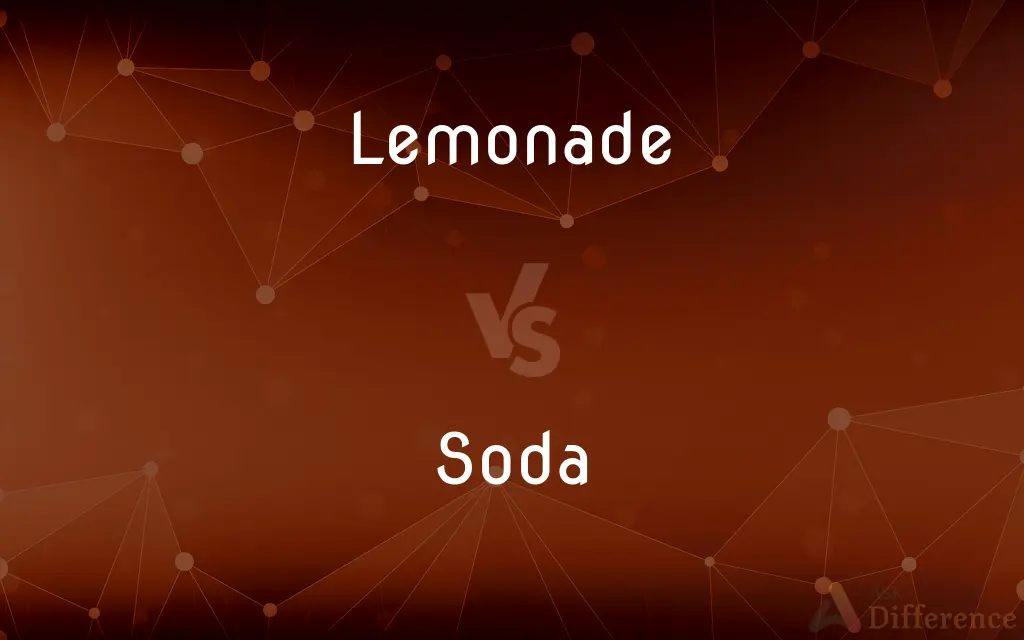Lemonade vs. Soda — What's the Difference?
Edited by Tayyaba Rehman — By Urooj Arif — Updated on April 22, 2024
Lemonade is a sweetened beverage primarily made from lemons, water, and sugar, offering a fresh, natural taste; soda is a carbonated soft drink that may contain various flavors, sweeteners, and often caffeine, providing a wide range of taste experiences.

Difference Between Lemonade and Soda
Table of Contents
ADVERTISEMENT
Key Differences
Lemonade, traditionally a homemade drink, consists of lemon juice mixed with water and sweetened with sugar. It is known for its tart, refreshing flavor that embodies simplicity and natural ingredients. On the other hand, soda is a commercially produced drink that features carbonation and a variety of artificial or natural flavors, and it often includes additives like preservatives and colorings.
The preparation of lemonade involves squeezing fresh lemons, adding water and sugar, and occasionally ice, making it a staple for cooling down on hot days. Whereas soda is manufactured in factories through the carbonation process, where CO2 is infused into water under pressure, often accompanied by the addition of flavorings and sweeteners.
Health-wise, lemonade can be seen as a healthier option if prepared without excessive sugar, as it provides vitamin C and hydration. Conversely, soda typically contains higher levels of sugars or artificial sweeteners and other additives, which may contribute to health issues like obesity or diabetes when consumed frequently.
Lemonade is often associated with summer days, outdoor events, and family gatherings, reflecting a homey, wholesome vibe. Soda, however, is marketed globally and is omnipresent in various social settings, from dining establishments to vending machines, embodying a more commercial and versatile appeal.
While lemonade's flavor is predominantly defined by the natural acidity and sweetness of lemons, soda offers a much broader spectrum of flavors from classic cola to exotic fruit flavors catering to diverse consumer preferences and occasions.
ADVERTISEMENT
Comparison Chart
Base Ingredients
Lemons, water, sugar.
Water, carbon dioxide, sweetener, flavorings.
Texture
Non-carbonated, smooth.
Carbonated, fizzy.
Flavor
Tart and sweet, relatively consistent.
Wide range, from cola to cherry and beyond.
Health Aspect
Lower in additives, can be made with natural ingredients.
Often contains artificial additives and higher sugar content.
Cultural Image
Classic, homemade, and natural.
Commercial, versatile, widely marketed.
Compare with Definitions
Lemonade
Often homemade and served cold with ice.
Homemade lemonade is a favorite at summer barbecues.
Soda
Frequently criticized in health discussions due to sugar content.
Drinking too much soda is linked to health problems.
Lemonade
Symbolic of simplicity and summer refreshment.
Nothing beats the heat like a glass of ice-cold lemonade.
Soda
A carbonated soft drink with various artificial or natural flavors.
He bought a soda from the vending machine during the break.
Lemonade
Sometimes flavored with additional fruits like strawberries or raspberries.
They offered raspberry lemonade at the café.
Soda
Can contain caffeine and other additives like phosphoric acid.
Most colas have caffeine, which can be stimulating.
Lemonade
A beverage made from lemon juice, water, and sugar.
They served fresh lemonade at the picnic.
Soda
Often a staple in social gatherings and available worldwide.
Soda is often served at parties and public events.
Lemonade
Can be a base for other drinks, like punches or mixed drinks.
She added some mint to the lemonade for an extra zing.
Soda
Comes in countless flavors and brands, often associated with fast food.
She prefers lime soda with her burger.
Lemonade
Lemonade is a sweetened lemon-flavored beverage. There are varieties of lemonade found throughout the world.
Soda
Any of various forms of sodium carbonate.
Lemonade
A drink made of lemon juice, water, and sugar.
Soda
Chemically combined sodium.
Lemonade
A flavoured beverage consisting of water, lemon, and sweetener, sometimes ice, served mainly as a refreshment.
Soda
See carbonated water.
Lemonade
A clear, usually carbonated, beverage made from lemon or artificial lemon flavouring, water, and sugar.
Soda
Chiefly Northeastern US, Eastern Missouri, & Southwestern Illinois See soft drink. tonic
Lemonade
Recreational drugs of poor or weak quality, especially heroin.
Soda
A refreshment made from carbonated water, ice cream, and usually a flavoring.
Lemonade
A beverage consisting of lemon juice mixed with water and sweetened.
Soda
(Games) The card turned face up and discarded at the beginning of faro.
Lemonade
Sweetened beverage of diluted lemon juice
Soda
(uncountable) Sodium bicarbonate (usually baking soda).
Soda
(uncountable) Sodium carbonate (usually washing soda).
Soda
(uncountable) Sodium in chemical combination.
Soda
(uncountable) Carbonated water (water impregnated with pressurised carbon dioxide, originally made with sodium bicarbonate).
Soda
Any carbonated (usually sweet) soft drink.
Soda
A glass, bottle or can of this drink.
Soda
(card games) The first card in the dealing box in the game of faro, which is discarded to leave 51 cards in play.
Soda
Sodium oxide or hydroxide.
Soda
Same as sodium, used in terms such as bicarbonate of soda.
Soda
Same as soda water.
Soda
A non-alcoholic beverage, sweetened by various means, containing flavoring and supersaturated with carbon dioxide, so as to be effervescent when the container is opened; - in different localities it is variously called also soda pop, pop, mineral water, and minerals. It has many variants. The sweetening agent may be natural, such as cane sugar or corn syrup, or artificial, such as saccharin or aspartame. The flavoring varies widely, popular variants being fruit or cola flavoring.
Soda
A sodium salt of carbonic acid; used in making soap powders and glass and paper
Soda
A sweet drink containing carbonated water and flavoring;
In New England they call sodas tonics
Common Curiosities
Can lemonade and soda be used interchangeably in cocktails?
Yes, both can be used in cocktails; lemonade for a tart, fresh taste, and soda for fizz and variety in flavors.
How does the carbonation in soda affect its taste compared to non-carbonated lemonade?
Carbonation adds a sharp, effervescent texture to soda, enhancing its flavor profile, unlike the smooth texture of non-carbonated lemonade.
Are there any low-sugar options for both lemonade and soda?
Yes, both drinks are available in low-sugar or sugar-free versions, catering to health-conscious consumers.
Why is soda more prevalent in fast food settings than lemonade?
Soda’s quick, scalable production and easy storage make it a convenient choice for fast food settings, plus its variety complements a wide range of flavors.
What makes lemonade a healthier option compared to soda?
Lemonade typically contains fewer additives and can be made with natural ingredients, while soda often has higher sugar levels and artificial components.
What are some popular variations of lemonade and soda?
Popular lemonade variations include pink lemonade and flavored versions like mango or blueberry lemonade. Soda variations are extensive, including diet versions, caffeine-free options, and exotic flavors like passionfruit or lychee.
What roles do lemonade and soda play in diet-focused communities?
Within diet-focused communities, lemonade might be considered a healthier option when made with less sugar, while diet sodas are popular among those avoiding sugar but still seeking a carbonated drink.
What nutritional benefits does lemonade offer?
Lemonade provides vitamin C and hydration, especially if made without added sugars.
What are the environmental impacts of producing lemonade vs. soda?
Producing soda typically has a higher environmental impact due to industrial production processes and packaging, whereas homemade lemonade has a lower footprint if ingredients are sourced locally.
How do cultural perceptions of lemonade and soda differ?
Lemonade is often viewed as a traditional, wholesome beverage, especially in America where it's linked to nostalgia and simplicity. Soda, being highly commercialized, is seen as more modern and global.
Can both lemonade and soda be part of a balanced diet?
In moderation, both can fit into a balanced diet, though it's important to consider the sugar content and presence of other additives in soda.
How have lemonade and soda marketing strategies differed historically?
Lemonade is often marketed on its natural and refreshing qualities, while soda marketing has focused on lifestyle, youth culture, and global branding.
What are the economic impacts of the lemonade and soda industries?
The soda industry significantly impacts economies through large-scale manufacturing, employment, and marketing. The economic impact of lemonade is less pronounced but important locally, particularly in regions where fresh lemons are grown.
How has the public perception of soda changed in recent years?
Increasing health awareness has somewhat tarnished soda's image, pushing manufacturers to introduce healthier options, like organic or reduced-sugar sodas.
Is lemonade or soda more popular globally?
Soda is more globally popular due to its widespread availability and variety, as well as major international marketing campaigns.
Share Your Discovery

Previous Comparison
Pierogi vs. Pedaheh
Next Comparison
Cooper vs. HooperAuthor Spotlight
Written by
Urooj ArifUrooj is a skilled content writer at Ask Difference, known for her exceptional ability to simplify complex topics into engaging and informative content. With a passion for research and a flair for clear, concise writing, she consistently delivers articles that resonate with our diverse audience.
Edited by
Tayyaba RehmanTayyaba Rehman is a distinguished writer, currently serving as a primary contributor to askdifference.com. As a researcher in semantics and etymology, Tayyaba's passion for the complexity of languages and their distinctions has found a perfect home on the platform. Tayyaba delves into the intricacies of language, distinguishing between commonly confused words and phrases, thereby providing clarity for readers worldwide.














































